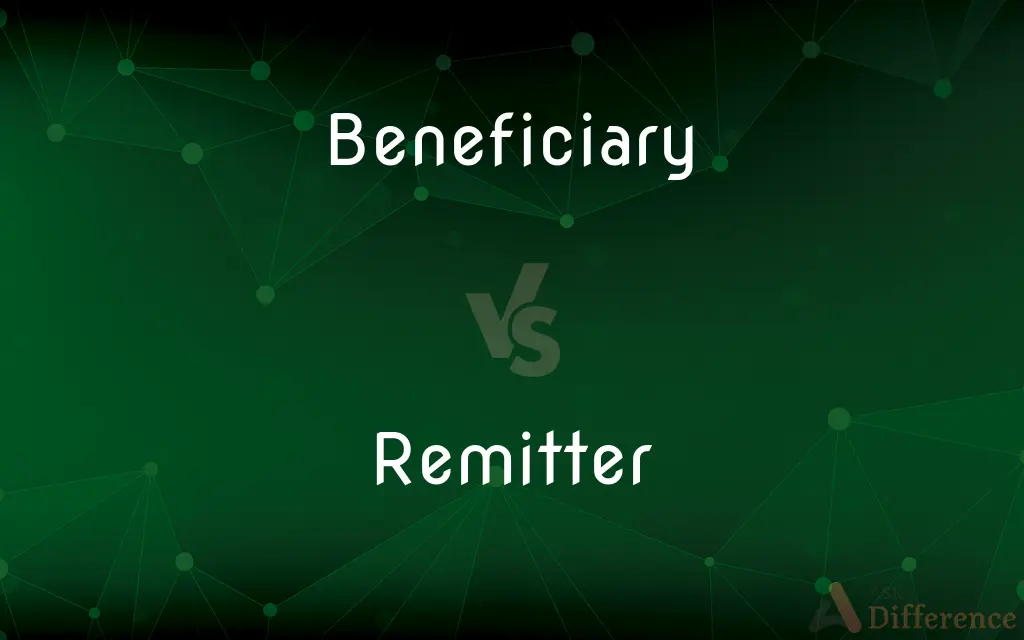Beneficiary vs. Remitter — What's the Difference?
Edited by Tayyaba Rehman — By Fiza Rafique — Updated on March 25, 2024
A beneficiary is someone who receives benefits from a transaction, while a remitter is the person who makes the payment or sends money.

Difference Between Beneficiary and Remitter
Table of Contents
ADVERTISEMENT
Key Differences
A beneficiary refers to an individual or entity that is entitled to receive benefits or funds from a financial transaction or legal arrangement. This term is commonly associated with insurance policies, wills, and trust funds, where beneficiaries are designated to receive proceeds or assets. On the other hand, a remitter is the party who initiates a payment or transfer of money, often in the context of a transaction or in fulfilling an obligation. While beneficiaries are on the receiving end of transactions, remitters are on the sending end, highlighting their distinct roles in financial and legal contexts.
In legal documents and financial agreements, specifying a beneficiary ensures that the intended party receives the benefits or assets upon the occurrence of a specified event, such as the death of the policyholder or the maturation of a trust. Conversely, remitters are often identified in the context of payments, where they authorize and send funds to fulfill a transaction, pay a bill, or settle a debt. The clarity of these roles is crucial for the proper execution of legal and financial processes.
Beneficiaries are typically protected by legal rights that guarantee their receipt of assets or funds under the conditions laid out in contracts or agreements. These protections ensure that the benefits are transferred according to the wishes of the grantor or the legal requirements of the agreement. Remitters, however, are responsible for ensuring that their payments are accurate, timely, and compliant with the terms of the transaction or obligation, bearing the burden of initiating the transfer of funds.
The identification of beneficiaries is critical in estate planning and insurance policies, where the specifics of asset distribution and benefit allocation are determined. This foresight ensures that assets and benefits are distributed according to the wishes of the deceased or the policyholder. In contrast, remitters must navigate various payment methods and channels to execute their transfers, from traditional bank wires and checks to digital payment platforms, each with its protocols and requirements.
Despite their differences, both beneficiaries and remitters play integral roles in the dynamics of financial transactions and legal arrangements. Beneficiaries ensure that the intentions of individuals or entities in distributing assets or benefits are realized, while remitters fulfill the necessary actions to transfer funds or make payments, ensuring the completion of transactions and the fulfillment of obligations.
ADVERTISEMENT
Comparison Chart
Role in Transactions
Receives benefits or funds
Initiates and sends payments
Context
Legal documents, financial agreements, insurance, wills, trusts
Payment transactions, financial transfers
Legal Rights
Entitled to receive specified benefits or assets
Responsible for making accurate and timely payments
Responsibility
To be identified correctly for receipt of assets or funds
To initiate and complete the transfer of funds
Associated Actions
Receiving assets, benefits, or funds
Sending money, authorizing payments
Compare with Definitions
Beneficiary
An individual or entity entitled to receive funds or benefits.
She was named the sole beneficiary of her grandmother's estate.
Remitter
A person or entity that sends a payment.
As the remitter, she ensured the wire transfer was sent early in the morning.
Beneficiary
Entitled to proceeds from financial agreements.
As a beneficiary, he received the insurance payout after the accident.
Remitter
Sends money through various channels.
Using a mobile app, the remitter completed the monthly utility payments.
Beneficiary
Receives assets from a will or insurance policy.
The charity became a beneficiary of the generous donation.
Remitter
Responsible for authorizing fund transfers.
The business acted as the remitter for the large international transaction.
Beneficiary
Gains from a trust or financial instrument.
The trust's beneficiaries received their distributions on time.
Remitter
Initiates transactions to fulfill an obligation.
The remitter paid the invoice via an online banking portal.
Beneficiary
Receives benefits in a legal arrangement.
The beneficiaries of the scholarship fund were selected based on merit.
Remitter
Engages in sending funds as part of a transaction.
As the remitter, he chose to send the payment via electronic check.
Beneficiary
A beneficiary (also, in trust law, cestui que use) in the broadest sense is a natural person or other legal entity who receives money or other benefits from a benefactor. For example, the beneficiary of a life insurance policy is the person who receives the payment of the amount of insurance after the death of the insured.
Remitter
To transmit (money) in payment.
Beneficiary
One that receives a benefit
I am the beneficiary of your generosity.
Remitter
To refrain from exacting (a tax or penalty, for example); cancel.
Beneficiary
The recipient of funds, property, or other benefits, as from an insurance policy or trust.
Remitter
To pardon; forgive
Remitted their sins.
Beneficiary
(Ecclesiastical) The holder of a benefice.
Remitter
To restore to a former condition or position.
Beneficiary
One who benefits or receives an advantage.
You are the lucky beneficiary of this special offer.
Remitter
To refer (a case) to another court for further consideration or action.
Beneficiary
(legal) One who benefits from the distribution, especially out of a trust or estate.
If any beneficiary does not survive the Settlor for a period of 30 days then the Trustee shall distribute that beneficiary’s share to the surviving beneficiaries by right of representation.
Remitter
To refer (a matter) to a committee or authority for decision.
Beneficiary
(insurance) One who benefits from the payout of an insurance policy.
Remitter
To allow to slacken
The storm remitted its fury.
Beneficiary
Holding some office or valuable possession, in subordination to another; holding under a feudal or other superior; having a dependent and secondary possession.
Remitter
To transmit money.
Beneficiary
Bestowed as a gratuity.
Beneficiary gifts
Remitter
To diminish; abate
The symptoms of the disease remitted.
Beneficiary
Holding some office or valuable possession, in subordination to another; holding under a feudal or other superior; having a dependent and secondary possession.
A feudatory or beneficiary king of England.
Remitter
A matter remitted for further consideration.
Beneficiary
Bestowed as a gratuity; as, beneficiary gifts.
Remitter
Chiefly British An area of responsibility; scope.
Beneficiary
A feudatory or vassal; hence, one who holds a benefice and uses its proceeds.
Remitter
One who remits, or makes remittance.
Beneficiary
One who receives anything as a gift; one who receives a benefit or advantage; esp. one who receives help or income from an educational fund or a trust estate.
The rich men will be offering sacrifice to their Deity whose beneficiaries they are.
Remitter
One who pardons.
Beneficiary
The recipient of funds or other benefits
Remitter
(legal) The sending or placing back of a person to a title or right formerly held; the restitution of one who obtains possession of property under a defective title, to his rights under some valid title by virtue of which he might legally have entered into possession only by suit
Beneficiary
The semantic role of the intended recipient who benefits from the happening denoted by the verb in the clause
Remitter
One who remits.
Beneficiary
Having or arising from a benefice;
A beneficiary baron
Remitter
The sending or placing back of a person to a title or right he had before; the restitution of one who obtains possession of property under a defective title, to his rights under some valid title by virtue of which he might legally have entered into possession only by suit.
Common Curiosities
Can someone be both a beneficiary and a remitter?
Yes, an individual or entity can act as both in different transactions or arrangements.
What responsibilities does a remitter have?
A remitter must ensure accurate, timely, and compliant fund transfers according to the transaction's terms.
How do legal rights differ between beneficiaries and remitters?
Beneficiaries have rights to receive specified assets or funds, while remitters have obligations to make payments accurately and on time.
Can a beneficiary's rights be contested?
Yes, beneficiary rights can be contested in legal disputes or if the documentation is unclear or contested.
In what contexts might a beneficiary be named?
Beneficiaries are named in contexts like insurance policies, wills, trusts, and financial agreements.
What is the significance of a remitter in a transaction?
The remitter initiates the transfer of funds, ensuring the completion of transactions and fulfillment of obligations.
What distinguishes a beneficiary from a remitter?
A beneficiary receives benefits or funds, whereas a remitter is responsible for making payments or sending money.
Why is it important to correctly identify a beneficiary?
Correct identification ensures that benefits or assets are distributed according to legal or contractual intentions.
What is the process for a beneficiary to claim benefits?
The process typically involves submitting documentation to prove entitlement and comply with the terms of the will, policy, or agreement.
Are remitters always individuals?
No, remitters can also be entities, such as companies or organizations, that initiate payments.
What are some common methods a remitter might use to send payments?
Remitters may use bank transfers, checks, digital payment platforms, and other electronic means.
How do digital payment platforms impact the role of a remitter?
They simplify and expedite the process, offering more convenience and efficiency for remitters to send payments.
Why might someone choose to be anonymous as a remitter?
For privacy, security reasons, or when making donations, some may choose anonymity in their transactions.
What happens if a beneficiary is not correctly identified?
It can lead to legal disputes, delays in asset distribution, or assets being distributed contrary to the intentions of the will or policy.
Can a remitter cancel a transaction after initiating it?
Depending on the method and timing, some transactions may be cancellable, while others might not.
Share Your Discovery

Previous Comparison
Elf vs. Goblin
Next Comparison
Pianissimo vs. PianoAuthor Spotlight
Written by
Fiza RafiqueFiza Rafique is a skilled content writer at AskDifference.com, where she meticulously refines and enhances written pieces. Drawing from her vast editorial expertise, Fiza ensures clarity, accuracy, and precision in every article. Passionate about language, she continually seeks to elevate the quality of content for readers worldwide.
Edited by
Tayyaba RehmanTayyaba Rehman is a distinguished writer, currently serving as a primary contributor to askdifference.com. As a researcher in semantics and etymology, Tayyaba's passion for the complexity of languages and their distinctions has found a perfect home on the platform. Tayyaba delves into the intricacies of language, distinguishing between commonly confused words and phrases, thereby providing clarity for readers worldwide.















































